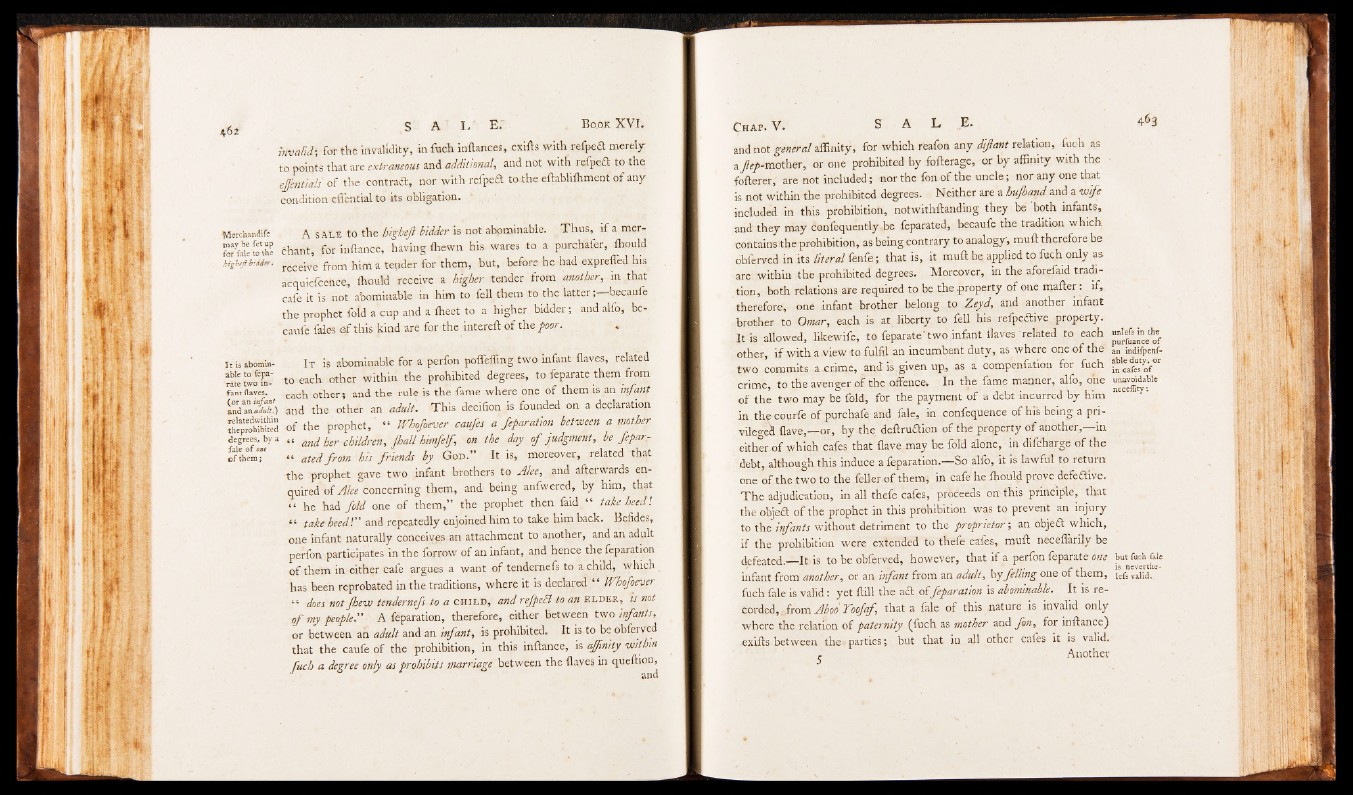
invalid- for the Invalidity, in inch inftances, exifts with refpea merely
to points that are extraneous and additional, and not; with refpea to the
effentials' of the contract, nor with refpea tocthe eftablifhment of any
condition eflential to its obligation. *
Merchandife A s a l e to the highefl bidder is not abominable. Thus, ifamer-
ehant, for inftance, having {hewn his wares to a purcHafer, fhouM
bigheftUdAtr. j.gcejve from him a tender for them, but, before he -had expreffed his
a c q u ie fc e h c e , (hould receive a higher tender from another, in that
cafe it is not abominable in him to fell them to the latter ;-beca.ufe
the prophet fold a’cup and a fheet to a higher bidder; and alfo, be-
caufe fales of this kind are for the intereft of the poor.
I t is abomin- I t is abominable for a perfon pofleffing two infant Haves, related
r“ e uvo'in- to each other within the prohibited degrees, to feparate them from
fan tfla v es , eadh other; and the rule is the fame where one of them is an infant
L” d ^ t ) and the other an adult. This decifion is founded on a declaration
Slpro“ of the prophet,' “ Whofbever caufes a Separation between a mother
degrees, by a her children, fh a ll himfelf, on the day o f judgment, be feparo
f them; “ ated from his friends by G o d . ” It is, moreover, related t h a t
the prophet gave two infant brothers to Alee, and afterwards enquired
of Alee concerning them, and being anfwered, by him, that
“ he had fold one of them,” the prophet then faid “ take heedl
“ take heed!” and repeatedly enjoined him to take him back. Befides,
one infant naturally conceives an attachment to another, and an adult
perfon participates in the forrow of an infant, and hence the feparation
of them in either cafe argues a want of tendernefs to a child, which
has been reprobated in the traditions, where it is declared “ Whofoever
“ does notfhew tendernefs to a c h i l d , and refpeft to an e l d e r , is not
o f my people.” A feparation, therefore, either between two infants,
or between an adult and an infant, is prohibited. It is to be obferved
that the caufe of the prohibition, in this inftance, is affinity within
fuch a degree only as prohibits marriage between the flayes in queftion.
and not general affinity, for which reafon my diflant relation, fuch as
a ƒ «^-mother, or one prohibited by fofterage, or by affinity with the •
fofterer, are not included; nor the fon of the uncle; nor any one that
is not within the prohibited degrees. Neither are a hujbapd and a wife
included in this prohibition, notwithftanding they be both infants,
and they may donfequently.be feparated, becaufe the tradition which
contains the prohibition, as being contrary to analogy, miift therefore be
obferved in its literal fenfe; that is, it . muft be applied to fuch only as
are within the prohibited degrees. Moreover, in the aforefaid tradition,
both relations are required to be the property of one matter: if,
therefore, one infant brother belong to Zeyd, and another infant
brother to Omar, each is at liberty to fell his refpeaive. property.
It is allowed, likewife, to feparate-two infant Haves related to each | | | | | | |
other if w ith a,view to fulfil an incumbent duty, as where one o f the an indifpenf-
two commits ,a .crime, and is given up, as a compenfation for fuch
crime, to the avenger of the .offence, In the fame manner, alfo, ohe
of the two may be fold, for the payment of a debt incurred by him
in the-courfe of purchafe and fale, in confequence of his being a privileged
{lave,— or, by the deftruaion of the property of another,— in
either.of yrhiGh cafes that {lave may be fold alone, in difc'harge of the
debt, although this .induce a feparation.— So alfo, it is lawful to return
one of the two to the feller o f them, in cafe he fhould prove defoaive.
The adjudication, in all thefe cafes, prbc'eeds on' this principle, that
the objea of the prophet in this prohibition was to prevent an injury
to the infants without detriment to the proprietor; an objea which,
if the prohibition were extended to thefe cafes, muft neceflarily be
defeated.— It is to be obferved, however, that if a perfon feparate one butjbc^'ale
infant from another, or an infant from an adult, by felling one of them, iefs valid,
fuch fale is valid: yet {till the a a offeparation is abominable. It is recorded,
from TToofcf, that a fale of this nature is invalid only
where the relation of paternity (fuch as mother and fon, for inftance)
exifts between the^parties; but that in all other cafes it is valid.
r Another